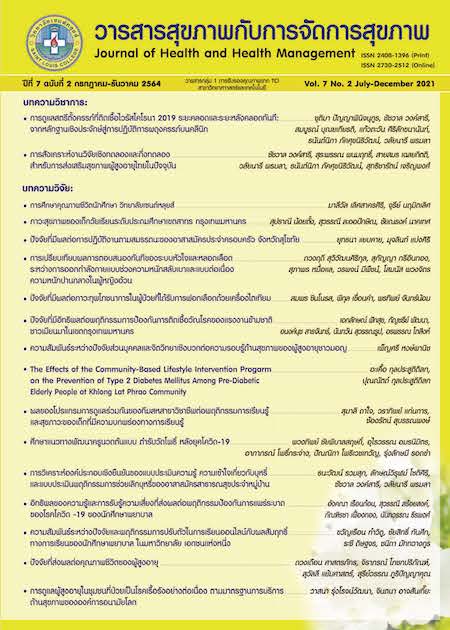The Effects of Multidisciplinary Collaborative Care Program on Learning Behavior and Health of Children with Learning disabilities
Keywords:
Multidisciplinary Collaborative Care Program, Learning Behavior, Health, Children with Learning disabilitiesAbstract
This quasi-experimental research design is a one-group pretest-posttest research design. The main purpose of this study was to determine the effects of multidisciplinary collaborative care program on learning behavior and health of children with learning disabilities. The sample included 23 children with learning disabilities, selected by simple random sampling. The research instruments were 1) a learning behavior assessment form (reading, writing, and calculation) 2) a health assessment form (physical, mental, and emotional, social, and intellectual). The questionnaires were approved by experts for their content validity. The index of item objective Congruence (IOC) values were .86 and .85 respectively. The overall reliability of the questionnaires, using Cronbach’s alpha coefficient, were .85 and .89 respectively. Data was analyzed using percentage, mean, standard deviation, and paired t-test.
The results of this study showed that children with learning disabilities showed statistically significant individual and overall improvement in cognitive behavior and health after participating in a multidisciplinary collaborative care program (p-value < .05). However, the duration of the follow-up evaluation should be extended to better reflect the effectiveness of the multidisciplinary collaborative care program.
References
จิรดา แก้วขาว, และนวลฉวี ประเสริฐสุข. (2558). การใช้สีกำหนดพยัญชนะเพื่อพัฒนาความสามารถในการ อ่านคำมาตรตัวสะกดแม่กนที่ไม่ตรงตามมาตราของนักเรียนที่มีความบกพร่องทางการเรียนรู้. Veridian E-Journal, Silpakorn University, 8(3), 55-70.
ดารณี ศักดิ์ศิริผล. (2556). การศึกษาภาวะสมาธิสั้นในเด็กที่มีความบกพร่องทางการเรียนรู้ในเขตกรุงเทพมหานคร. ภาควิชาการศึกษาพิเศษ คณะศึกษาศาสตร์มหาวิทยาลัยศรีนครินทรวิโรฒ.
นพวรรณ ศรีวงค์พานิช, จันทร์อาภา สุขทัพภ์, วนิดา ชนินทยุทธวงศ์, และอัมพร เบญจพล พิทักษ์ (2562). ความสัมพันธ์ระหว่างความเสี่ยงต่อโรคสมาธิสั้นออทิซึมภาวะบกพร่องทางการเรียนรู้และภาวะบกพร่องทางสติปัญญา จากการสังเกตโดยครูกับระดับสติปัญญา (IQ) ของเด็กไทยชั้นประถมศึกษาปีที่ 1. วารสารสุขภาพจิตแห่งประเทศไทย, 27, 159-70.
นพพร ตุ้มทอง. (2552). การฝึกด้วยกิจกรรมศิลปะเพื่อเพิ่มความสามารถในการจำรูปพยัญชนะของนักเรียนที่มีภาวะบกพร่องทางการเรียนรู้. นครปฐม; มหาวิทยาลัยศิลปากร.
มลฑิรา โพธิสุวรรณ, เกียรติกำจร กุศล และ ธิดารัตน์ เอกศิรินิมิตร. (2563). ผลของโปรแกรมสนับสนุนศักยภาพครอบครัวต่อความสามารถทางการเรียนรู้ในนักเรียนที่มีความบกพร่องทางการเรียนรู้. วารสารสุขภาพจิตแห่งประเทศไทย, 28(3), 187-98.
สำนักบริหารงานการศึกษาพิเศษ. (2562). ระบบบริหารจัดการข้อมูลโรงเรียนเรียนรวม. สืบค้นเมื่อ 23 มีนาคม 2563 เข้าถึงได้จาก http://202.29.172.121/specialbasic/index.php?p=home
สมลักษณ์ กอกุลจันทร์, มรรยาท รุจิวิชชญ์, และพนิดา ศิริอำพันธ์กุล. (2561). ผลของโปรแกรมการดูแลสุขภาพ แบบองค์รวมต่อพฤติกรรมการดูแลเด็กของผู้ดูแลเด็กที่มีภาวะบกพร่องด้านการเรียน. วารสารการพยาบาลจิตเวชและสุขภาพจิต, 32(3),1-12.
American Psychiatric Association. (2013). Diganostic and statistical manual of mental disorders, 5th edition, DSM-5TM. American Psychiatric Association. Washington, DC : American Psychiatric Press.
Cohen, J.M., & Uphoff, N.T. (1981). Rural Development Participation: Concept and Measure For Project Design Implementation and Evaluation: Rural Development Com mittee Center for international Studies. New York: Cornell University Press.
Faul, F. (2014). G*Power version 3.1.9.2 Retrieved May 13, 2020, from: https://www.poycho.uni-duessldorf.de/abteilungen/aap/gpower3/
Meral, B,F., & Cavkaytar, A. (2012). A study on social support perception of parent who have children with autism. International Journal on New Trends in Education and Their Implications, 3(3), 124-33.
Pierce, K. (2010). Developmental disorders of learning, communication and motor skills. In : Dulcan MK, editor. Duncan’s Textbook of Child and Adolescent Psychiatry. American Psychiatric Publishing, Inc. : Washington, DC, 191-202.
Piyasil, V. (2011). Learning Disorders. In : Sigkalavanich, S., Kanjanapongkul, S., Jannuwat, S., editors. Pocketbook of Pediatric. Bangkok : Beyound Enterprice Inc, 546-54.
Punyapas, S., Techapoonpon, K., Tarugsa, J., & Seree, P. (2015). Knowledge and attitude about learning disorders among parents. The Psychiatric Association of Thailand, 60(3), 158-168.
Downloads
Published
How to Cite
Issue
Section
License
Copyright (c) 2021 Journal of health and health management

This work is licensed under a Creative Commons Attribution-NonCommercial-NoDerivatives 4.0 International License.




